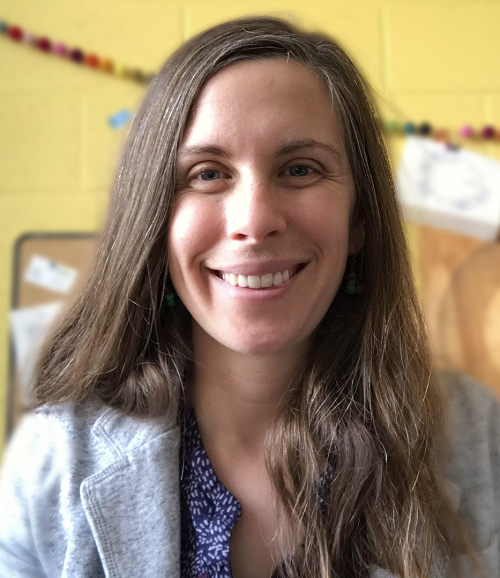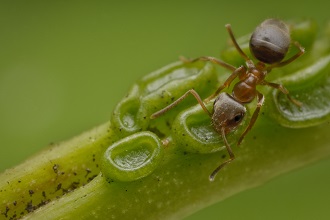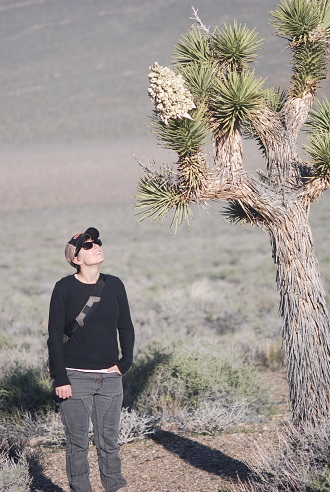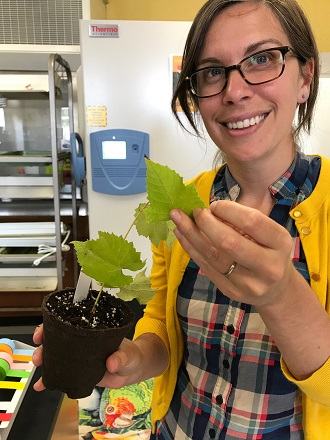About the department: I am an assistant professor in the Department of Plant Biology at Michigan State University. I am also a member of the cross-departmental program in Ecology, Evolutionary Biology and Behavior at MSU. Michigan State is a wonderful place to be a biologist! As a large agricultural institution, MSU really values biology research and teaching. Also, we are home to the incredible Kellogg Biological Station!
About the research: Research in my lab focuses on understanding how ecological interactions have shaped the striking diversity of life that has evolved on our planet. We study cooperative and antagonistic interactions between plants and insects, and evaluate hypotheses that link these interactions with macroevolutionary patterns across scales. We work in many systems, including ant-plant and ant-mite mutualisms, plant defense, and plant-pollination interactions. Together, our work lies at the nexus of ecology and evolutionary biology, and seeks to understand the role that species interactions have played in shaping branches of the tree of life. My lab is also home to
Project Biodiversify, an online space that provides methods and materials for inclusive teaching practices in biology college classrooms.
What has been the biggest challenge as a new PI so far? Too much stuff to do, not enough time to do it! Time management and juggling new (and old) responsibilities is a constant challenge. Despite all of the multi-tasking, I do love the variety of ways that I use my brain every day and all of the learning that goes with it. It really is a great job. I get the joy (and challenge) of wearing about 10 different hats each day as I bounce around from task to task. It isn’t boring, that’s for sure!
What has been the biggest surprise so far about being a new PI? I’m surprised at how hard teaching is. My professors always made it look easy. Teaching new courses takes so much behind-the-scenes preparation. I feel like I should write my old professors letters thanking them for all the hard work they were doing that I didn’t fully appreciate at the time!
How have you prepared to be a PI? Lots of good mentoring from my past advisors. I have been lucky to have such a wonderful team of people in my corner helping me figure out how to do this job. I learned so much from my PhD advisor, (Anurag Agrawal) and my postdoc advisors (Sharon Strauss, Santiago Ramirez, and Peter Wainwright). Watching them and asking questions was the best preparation I could have asked for.
How do you/will you approach mentoring new lab members? I love mentoring! I believe it is one of the primary ways I will make an impact in my job. Every student/lab member is different of course, so my mentoring philosophy is focused on individual approaches and a lot of honesty and openness. Overall though, I want folks in the lab to have independence and ownership of their projects and to find happiness and fulfillment in their scientific pursuits. I find that mentoring is one of the most rewarding and energy-giving parts of being faculty. I am continuously surprised by the variety of insights, the creativity, and the passion for science my lab members and undergraduate students display. They all give me so much hope for the world we live in!
Are you recruiting? If so, how do you/ will you choose new lab members? I am not actively recruiting right now, but I am always open to talking with people who are interested in the lab. If that is you, don’t hesitate to reach out!
When and why did you become a SSE member? I became a SSE member sometime in early graduate school. I have always loved evolutionary biology so much (and still do!). I couldn’t wait to join. A group of other people who are equally obsessed with the same cool biology you are into? It doesn’t get much better than that!
What does becoming a SSE member mean to you or your career? I’ve loved evolutionary biology for so long, and had dreamt of becoming a professional evolutionary biologist. Becoming an SSE member was very celebratory for me. I was officially an evolutionary biologist!
Do you have a funny story to share from an Evolution Meeting? In graduate school I won the Rosemary Grant Award. It was the first year the award existed, and Rosemary Grant was there to hand them out herself. I was SO excited to meet her that I couldn’t wait for the ceremony, I just ran up to her as soon as I saw her and said “Hi, I won the YOU award!” I immediately realized I was acting like an awkward overly excited fan and then I got nervous and forgot what to say and just gawked at her silently. She, of course, was super nice and proceeded to ask me lots of nice questions and be very forgiving of my superfan-dom.
When was your first Evolution Meeting, and how did it affect your career? My first Evolution meeting was in 2012 in Ottawa. It was an incredible experience for me. It really was like a dream! I felt like I had found my people, and I couldn’t get enough of the science.
Do you remember your first publication in Evolution or Evolution Letters (acceptance or rejection)? Yes, I definitely remember! It was a huge milestone for me. I had always wanted to publish in
Evolution. In fact, as an undergrad, I won a small departmental award and the prize was a subscription for a year to the journal of my choice. I chose
Evolution, and I was so excited to read every issue when it was delivered to my house. I would read it cover to cover, and I refused to throw out the copies (I moved them with me at least four separate times). It wasn’t until my postdoc that I actually had my first
Evolution paper. I was so excited that I wrote to the editor to tell them about my undergraduate journal subscription obsession and what the first publication in
Evolution meant to me. I was just so proud of myself. I felt like I was looking at myself from the past, and I was finally a bonafide evolutionary biologist.
If you could meet one other SSE member for the first time, who would it be and why? Mary Jane West-Eberhard. I have been a fan of hers for so long, and I have never met her!
Besides research, how do you promote science? I promote science through a smorgasbord of teaching and outreach activities, any number of which could be going on at a given time. One major effort is
Project Biodiversify, spearheaded by a postdoc in my lab – Dr. Ash Zemenick – and funded through NSF. Project Biodiversify promotes diversity and inclusion in classrooms, providing workshops on teaching topics surrounding sex and gender, as well as a set of tools for humanizing scientists in classrooms. As part of this effort, we are building a repository of easy-to-use teaching slides that highlight a diverse set of scientists as role models in lectures. We are looking for more submissions, so please contact us if you want to nominate yourself or others! Aside from our work with Project Biodiversify, we also have an artist-in-residence program in the lab, through which we host artists and promote communication across the art/science interface, and we do our best to talk to the public in outreach events whenever possible.
Do you teach evolution? What is the hardest concept to teach? I teach about evolution in my ecology class. I think one of the hardest things to get is the notion that natural selection is not forward thinking. That is just such a pervasive misconception.
What concept blows students’ minds? I love teaching about the absolute wonder associated with knowing that all things are connected via a common ancestor. I really like to dwell on that. I mean, wow.
How do you think evolutionary research benefits society? Evolutionary research benefits society in so many ways. The obvious points about antibiotic resistance, human and crop diseases, agricultural breeding programs are all true of course. Beyond that, in the time of climate change, an understanding of evolution has never been more important. And ultimately, evolution research tells us who we are and where we came from.
Do you have a time management tip to share? Focus on managing your energy, not your time. When you re-focus to thinking about your energy, it helps you be a better whole person, and that will lead to you being a more productive, impactful scientist.
What book should every evolutionary biologist read? Wow, EVERY evolutionary biologist?! I guess The Origin of Species?! But probably also Coyne and Orr. And then probably also Dune. :)
What one piece of advice would you give to a starting graduate student? You were motivated to go to graduate school because of some passion of yours (either a passion for the natural world, for the mysteries of how evolution works, etc.). Whatever that feeling is for you, my advice is to prioritize and protect it fiercely, not because it is fragile, but because it is priceless. We are so incredibly lucky to have the opportunity to go to graduate school (we actually get paid to learn about the world!). But at the same time, graduate school can sometimes have a way of deprioritizing our energy-giving passions for goal-oriented strategies (get more papers out, write more grants, etc). These goals are good of course (and so is strategy, as it helps you continue getting jobs doing the things you love doing), but all of it is useless if you lose sight of why you are doing this in the first place. Protect your enthusiasm, don’t let any negative vibes outweigh your awesome love of science. You got this!
What one piece of advice would you give to a postdoc? Enjoy the free time and the meandering days of doing just research! But also, if you are feeling down about the slog of applying to jobs and the culture of comparison that goes with that, you aren’t alone. It is totally normal for that part of the pipeline to be a bit of a drag. But don’t take that as a message that you aren’t cut out for this! I’m here from the other side to tell you that it gets better once you get through those dang applications! Also, see the advice for graduate students above.
How was your first faculty meeting? Not as exciting as I imagined it would be.
Did you ever have something go wrong in a talk? Once I had complete laryngitis at a meeting. My friend Will Wetzel kindly agreed to read out written notes from my slides for me while I stood there and gesticulated wildy at the images. It was.. ridiculous. People filmed it.
Do you remember making any mistakes as a trainee; how did you recover? Who doesn't make mistakes as a trainee?! I absolutely made (and make) many mistakes. My recovery strategy entails reminding myself that I am more than just my CV. How do I do that? I go hang out with the people who love me no matter how many field seasons fail or how many grants are rejected, I make something delicious for dinner, I spend some time painting or reading a novel, and I remember that I am much more than just my successes or failures as a scientist.
What is something most people don’t know about you?When I was a kid I went to a camp where you learned how to do gymnastics on the back of a horse. It was wild. I could ride a horse while standing up with my arms out. Can’t do THAT anymore!
What do you enjoy doing in your free time? In my free time I love adventuring with my three year-old-daughter, my partner, and my large shaggy dog. I love being a parent and a scientist! When I find time between family-fun and science-fun I also like painting, doting over my house plants, and potlucking with friends.
 Marjorie Gail Weber
Marjorie Gail Weber

